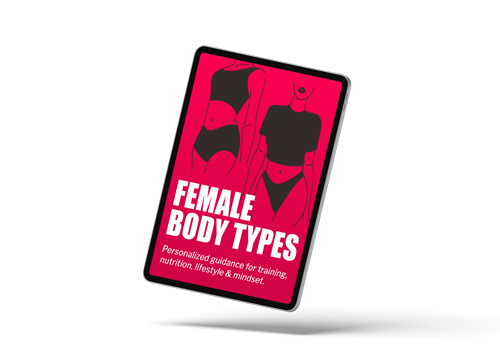
Magnesium is the supplement I recommend the most often for women. It provides an incredible range of benefits for women.
Personally, it’s the one supplement I can’t do without. When I started taking magnesium, my sleep, mood and premenstrual symptoms improved dramatically. I used to think I suffered from insomnia and, in particular, had a hard time falling and staying asleep. Magnesium changed all that for me. In fact, I ran out of magnesium a few months ago and went straight back into my insomnia-like patterns.
Magnesium has also been a wonder for my restless legs. It only takes one day without magnesium supplementation for my restless legs to come back with a vengeance.
Many of you also have experienced the benefits of magnesium first hand but it’s something I get asked about all the time so here’s everything you need to know about the one supplement that could truly change your life.
Benefits of magnesium for women
If you’ve got a problem, chances are magnesium can help solve it. These are just a few of the ways magnesium can rescue you:
1. Soothes your brain
Studies show magnesium decreases anxiety, depression and susceptibility to panic attacks. It also improves brain function, including having positive effects on learning and memory.
If you are trying to get pregnant, you should also keep your magnesium levels topped up because studies show mothers who were magnesium deficient when they fell pregnant are more likely to suffer from post partum depression.
2. Helps you respond better to stress
Mental and physical stress deplete your body of magnesium. Your body actually excretes magnesium when you are under stress. In turn, this creates a negative cycle because when your magnesium levels are low, you don’t respond as well to stress. When magnesium levels are low, you actually release more stress hormones.
Don’t wait until you are under stress to start taking magnesium because if your levels are topped up when stress hits, magnesium will prevent your body from overproducing cortisol.
3. Improves your sleep
If you have any issues with sleeping, you need to try magnesium. I wish I had known how much magnesium helps you sleep years ago! Not only does it help you fall asleep but it helps you stay asleep. If you get up often to use the bathroom during the night, magnesium can help reduce that too.
4. Reduces PMS, cramps and hot flashes
Studies show that magnesium is usually low, along with vitamin D and calcium, in women with PMS. Magnesium, often with vitamin B6, has been shown in numerous studies to help with PMS. Magnesium supplementation may also help with menstrual cramps.
If you are going through menopause, magnesium may help with hot flashes.
5. Improves thyroid function
Magnesium supplementation can help with both hypothyroid and hyperthyroid symptoms. In fact, supplementation with magnesium citrate has been shown to drop TSH levels back into the normal range.
6. Reduces headaches and migraines
If you suffer from frequent headaches, magnesium may give you some relief. Supplementation with magnesium has been shown to significantly reduce the frequency of migraines.
7. Maintains bones
Magnesium is very important for bone health. It works with calcium, phosphorus, and vitamins D and K2 to maintain bone health. A deficiency in magnesium can contribute to osteoporosis as we age.
8. Keeps your heart healthy
There is a lot of evidence that magnesium is related to heart health. Higher levels of magnesium are associated with reduced risk of high blood pressure and heart disease.
9. Boosts your energy
The cellular processes in your body responsible for energy creation need magnesium. Most of the steps of the Krebs cycle require magnesium (the Krebs cycle is how your body produces energy).
So if you often feel sluggish, fatigued and unmotivated, magnesium could help give you the boost of energy you need.
10. Helps with recovery from exercise
Any time your body uses up energy, it is depleting its magnesium levels. Also, we lose magnesium when we sweat. This means exercising increases your need for magnesium.
Taking magnesium can also provide relief from aches, pains, muscle cramps and help your recover faster.
How much magnesium do you need?
Most recommendations are for between 200-400mg of supplemental magnesium per day. Personally I find I sleep better with 300 or more mg than I do with 200mg. The only way to know for sure is to try it for yourself and see how you feel.
If you don’t feel any effect or benefits from taking magnesium it may not necessarily be that you don’t need magnesium. It could be that the supplement you are taking is not effective. As with all supplements certain forms are more bioavailable than others. That means certain forms of magnesium work better than others because your body is better able to use them.
How to choose a magnesium supplement
It’s hard to get enough magnesium from diet alone – even if you were able to eat the most perfect diet (which most of us don’t, especially if we are restricting calories). Unfortunately, many of our foods lack magnesium because the soil in which they are grown has been depleted and drained of nutrients from over-farming. Also, widely used herbicides act as chelators, which means they block the uptake and use of minerals like magnesium.
Sometimes we can have problems absorbing magnesium, especially as we get older, so topping up with supplements or using transdermal (absorbed through the skin) magnesium can help.
This is why I almost always recommend magnesium supplements to my clients. As with all supplements the quality and form matters.
Best Forms of Magnesium
Many cheaper products will use magnesium oxide which has been shown to not be absorbed as well by your body.
On the label, look for:
-Magnesium glycinate (also known as magnesium bisglycinate, magnesium diglycinate)
-magnesium malate
-magnesium amino acid chelate
-magnesium taurate
-magnesium citrate
-magnesium threonate
Magnesium threonate is a newer form of magnesium that claims to be better absorbed by your brain. In my experience, it does seem to have a noticeable effect on mood and focus. However, it is expensive compared to other magnesium. If you are interested in this form, you can read more about it in my article on supplements for anxiety here.
Watch for elemental magnesium
Ideally your supplement will list the amount of ‘elemental magnesium’ although not all supplements will do so. On the label there will be two numbers – one bigger one and then one that says something like “equiv. elemental”.
The amount of elemental magnesium is the measure of how much actual magnesium is in the supplement. Confusing I know – but the other number is bigger because the magnesium needs to be attached to something when they make the supplement.
If your supplement lists the elemental amount then you will have a better idea of how much magnesium is in that supplement.
Bottom line is always look for the elemental amount when considering how much magnesium is in a product.
If it doesn’t list the amount stick with a well absorbed form like the ones listed above and start with 200-400mg per day to see how your body responds.
Figuring out what works for you
This article only scrapes the surface of what magnesium can do for you. The only way you can know for sure is to try it for yourself. Make sure you buy a quality supplement and adjust your dose if you don’t feel any benefits.
Not all supplements are equal and I’ve definitely seen more improvements with certain supplements over others so don’t give up if it doesn’t work for you the first time you try it. As with everything it’s a matter of experimenting and figuring out what works for your body.
Disclaimer: The information in this article is not intended to provide medical advice. Supplements are not intended to treat or prevent any disease and you should always consult with your doctor if you have any concerns. Remember most doctors do not normally prescribe alternative treatments so they may not be aware of the benefits of certain supplements but they can tell you whether there are any issues and/or contraindications.







